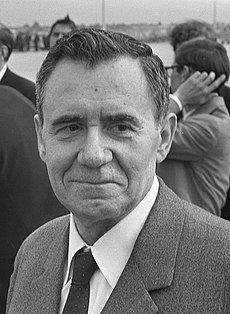Oleksii Dobrovolsky
This article is incomplete because it is pending further input from participants, or it is a work-in-progress by one author. Please comment on this article's talk page to share your input, comments and questions. Note: To contribute to this article, you may need to seek help from the author(s) of this page. |
Oleksii Dobrovolsky Олексій Добровольський | |
|---|---|
 Dobrovolsky pictured during a state visit to Slirnia in 1964 | |
| Chief of Staff of the State Police Unit (PDP) | |
| In office November 1, 1952 – February 4, 1971 | |
| Preceded by | Tselya Vanko |
| Succeeded by | Ladzimir Anachenko |
| Personal details | |
| Born | June 30, 1909 Shielvkasemysotka, Terekhivka FSR, UPSR (now Shielvkasemysotka, Terekhivka Buranate, Soravia) |
| Died | March 17, 1974 (aged 64) Samistopol, Samistopol FSR, UPSR |
| Nationality | Soravian |
| Political party | NPNV |
| Spouse | Valantina Sviontak |
| Children | 2 |
| Military service | |
| Allegiance | |
| Branch/service | Army PDP |
| Years of service | 1928–1935 1944–1971 |
| Rank | Corporal |
| Battles/wars | Western Front of the Great War Solarian War |
Oleksii Dobrovolsky (born Oleksii Tarasovych Dobrovolsky; June 30, 1909 – March 17, 1974; aged 64) was a Soravian military figure and politician who served as the Chief of Staff of the PDP between 1952 and 1971, encompassing most of the tenure of Gabriel Tozulyak. Dobrovolsky had been an unofficial adviser to Tozulyak since his senatorial days, and was incredibly influential in shaping his outlook as well as controlling information flow to him whilst he served as the PDP's Chief of Staff. Political analysts have referred to Dobrovolsky as one of the most notorious and powerful éminences grises of the 20th century during his tenure as the PDP's Chief of Staff, changing Soravia's domestic and foreign outlook and policies.
Dobrovolsky was born in 1909 in the rural farming village of Shielvkasemysotka as the fourth of six children born to father Maksim and mother Vasilina (née Biaric). His father was an industrial worker producing metals at the nearby Lyubarskaya Industrial Zone, and his mother was an immigrant from Lemovicia. At 19, Dobrovolsky was conscripted into the Soravian Army and sent to fight on the western front of the Great War. He was stationed at Krada, Świebodzin and later Kamnik in Slirnia. In 1935 he left the army as a corporal to pursue further education. After failed initial attempts, he went into work for six years, before joining Syrnitsa College in 1941, where he met Gabriel Tozulyak. Dobrovolsky left the college in 1943, joining the PDP during the Solarian War in 1944, and was stationed in Arciluco and Dubovica. He also began serving as an unofficial adviser to Tozulyak in 1950 when he was elected as a senator for Syrnitsa. Putting his political influence on Tozulyak throughout his senatorial period, the two developed a close political and personal bond that was expanded greatly when Dobrovolsky used a leadership scandal within the PDP to rise to its Chief of Staff position in 1952.
When Tozulyak became president in 1955, Dobrovolsky was entrusted behind the scenes as one of his closest advisors. He used this position, as well as his high-ranking position within the PDP, to control and limit the flow of information into the president, heavily influencing his political outlook to conform to his own interventionist views. Tozulyak oversaw one of the largest periods of Soravian military funding and expansion since the wartime era, and is thought to have been directly influenced by Dobrovolsky. He championed reformism and pushed Tozulyak to undergo the largest agricultural reforms in Soravian history with the introduction of large corporation farms and supply routes. Dobrovolsky is also thought to have been the arbiter of positive relations between the Amathian Equalist Republic as well as military intervention during the Thistle Uprising and the sale of uranium to fund Amathian nuclear power projects, moves that would all culminate in the NVNP's rejection of Tozulyak as president and his forced resignation shortly after Dobrovolsky stepped down as the PDP's Chief of Staff in 1971. Dobrovolsky died of cancer three years later in Samistopol.
Dobrovolsky's involvement in the Tozulyak presidency was not fully recognised until the declassification of state documents during Dobrovolsky's tenure in 1994. He was posthumously trialled and convicted of gross corruption and had all of his military honours stripped. Ivan Lecsko, president at the time of trial, controversially had Dobrovolsky's coffin removed from the July Mausoleum in Samistopol and relocated to the nearby Kravets Cemetery. He is a highly controversial figure in western Euclea but is widely studied for his effects on Soravian foreign policy, militarism and domestic economic reforms, as well as the gross misuse of his power and the potential nepotism that allowed him to adopt the role of an influential power behind the throne figure.